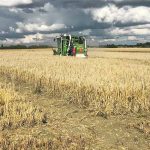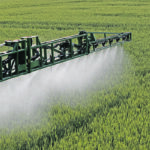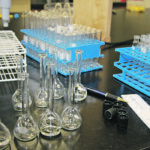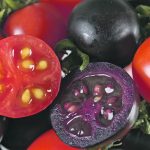Tomato varieties with purple skin do exist, but antioxidant levels are low because they are only in the skin of the fruit
There are a surprising number of purple foods. There are purple potatoes, eggplant, grapes, purple cabbage, purple carrots, saskatoons and blackberries, which are more black than purple. Next year, another food can be added to the list — purple tomatoes. In early September the U.S. Department of Agriculture said a genetically modified tomato, with purple […] Read moreTag Archives genetic modification

Consumer fears continue to hold back GM wheat
Attitudes toward genetically modified crops vary around the world, but GM corn and soybeans enjoy widespread use
CHICAGO (Reuters) — Nearly all corn and soybean acres in the world’s largest exporting countries are seeded with genetically modified varieties, but that is not the case for wheat, a crop grown primarily for human food. Biotech varieties of corn and soy, used for animal feed, biofuels and ingredients like cooking oil, were introduced in […] Read more
Canola may get genetic advantage over clubroot
University of Alberta study will explore 30 varieties of canola and plants such as cabbage looking for disease resistance
Scientists seeking to slow the spread of a plant parasite in Alberta that can stunt and kill canola crops have launched a five-year research project to genetically boost resistance to the disease. Clubroot has infected 44 out of 66 municipalities where canola is grown, said Stephen Strelkov, a professor of plant pathology at the University […] Read more
Researchers test nitrogen-fixing barley variety
U.K. scientists hope the end result will be cereal crops that are able to pull more nitrogen and phosphorus from the soil
British plant scientists plan to field test a new variety of barley that is designed to co-operate with beneficial fungi in the soil. If the tests are successful, it could pave the way for wheat, oats and other crops that pull more nitrogen and phosphorus from the soil. This month in England, researchers from the […] Read more
What is bioengineered food? An agriculture expert explains
The U.S. Department of Agriculture defines bioengineered food as food that “contains detectable genetic material that has been modified through certain lab techniques that cannot be created through conventional breeding or found in nature.” If that definition sounds familiar, it is because it is essentially how genetically modified organisms, or GMOs, are defined – common […] Read more

Biotech regulation should be relaxed
At what point do regulatory experts possess sufficient knowledge on innovative technologies and their potential impacts, both beneficial and adverse, that they decide regulation is no longer required? Ideally, we would be able to have products seamlessly enter the market that required no regulatory oversight. The reality of this is unlikely because one role of […] Read more

Alarm grows over EU’s ‘farm to fork’ policy
Exporting nations become increasingly worried the bloc plans to keep out food not produced under its production regime
Europe’s attempts to impose its approach to agriculture on the world are a threat to other leading agricultural powers, says a leading American trade expert. The “farm to fork” policy of the European Union could push restrictive EU regulations onto anybody hoping to export agricultural goods into the vast market. “I’m frustrated that there’s this […] Read more
Plenty of blame for biotech scepticism
Biotechnology began to be applied to crop agriculture in the early 1980s, with the first commercialized products coming to market in the mid-1990s. Biotech-developed crops, fruits and vegetables have been approved for production and consumption, following more than 4,400 risk assessments by government scientists in more than 70 countries. Over the past 25 years, no […] Read more

GM crop opposition called outdated
The Cartagena Protocol on Biosafety (CPB) is an international agreement developed by governments and environmental organizations opposed to the commercialization of genetically modified crops and agricultural biotechnology. Drafted in 2000, the CPB is a sub-agreement of the United Nations Convention on Biological Diversity. To date, 90 countries have ratified the CPB, but the major GM […] Read more

Researchers want GMO transparency
There has long been consumer interest in genetically modified food, including criticism that there is not enough public information about GM and gene edited crops in the food supply. Now, researchers at North Carolina State University are calling for a coalition of the biotech industry, government, non-government organizations, trade organizations and academic experts to tackle […] Read more




